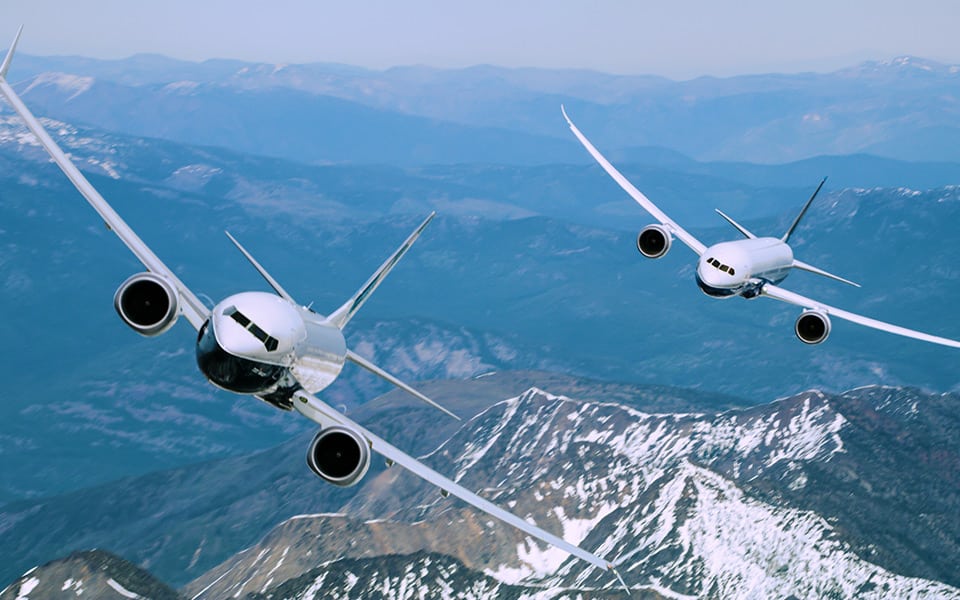It has been said that the Dubai Airshow is where deals are made. That proved true for several lessors and original equipment manufacturers (OEM) at the show’s most recent installment, which occurred last week. Boeing, Airbus and Bombardier walked away with a few blockbuster purchase orders and potential transactions in hand.
Boeing

Image courtesy of Boeing
At the end of the show, Boeing said it had signed 296 commercial jet orders and commitments — including 50 options — valued at a cool $50 billion.
The majority of that $50 billion came from a deal with flydubai. An agreement announced Nov. 15 for 225 737 MAXs had a list price of $27 billion. According to the OEM, this deal “represents the largest-ever single-aisle jet order — by number of airplanes and total value — from a Middle East carrier.” More than 50 of the first 175 aircraft are set to be 737 MAX 10s. The rest of that would be made up of MAX 8s and MAX9s. This follows a “record” 2013 Dubai Airshow order of flydubai’s for 75 MAXs and 11 737-800s.
EgyptAir agreed to lease six 787-9 Dreamliners for AerCap during the show. The Dublin-based lessor is the “world’s largest 787 customer,” Boeing said, with more than 115 of the aircraft owned or ordered.
Ethiopian Airlines ordered four 777 Freighters last week. This deal is valued at more than 1.3 billion at list prices.
Aviation Lease and Finance Company (ALAFCO) finalized an order for 20 more 737 MAX 8s in Dubai. This doubles the firm’s orders for the MAX aircraft, which now sits at 40. This deal, announced during the Paris Air Show, is valued at $2.2 billion at current list prices.
Azerbaijan Airlines ordered five more 787-8 Dreamliners and committed to purchasing two large freighters. Boeing said the deal is valued at about $1.9 billion at current list prices.
Emirates committed to spending billions with Boeing on 787-10 Dreamliners and related equipment. At list prices, the 40 aircraft and other equipment is valued at $15.1 billion. This order would start changing hands in 2022, continuing through to the 2030s.
Airbus

These four airlines are set to operate A320neos from Indigo Partners. Rendering by Fixion, courtesy of Airbus
The French OEM left the Dubai Airshow with announcements for 510 aircraft, including rotorcraft.
Following the trend for “historic” deals, Airbus bagged a memorandum of understanding for 430 A320neo jetliners. Valued at $49.5 billion at list prices, the deal was negotiated by private equity firm Indigo Partners. The aircraft would be operated by Frontier Airlines, JetSMART, Volaris and Wizz Air. The agreement represents the OEM’s “largest single commercial jetline announcement by aircraft numbers, while setting a company record “ in terms of its list price value.
Golden Falcon Aviation signed a memorandum of understanding during the show, too. The exclusive aircraft provider of Wataniya Airways wants 25 A320neo aircraft.
Air Sénégal signed a memorandum of understanding for two A330neos. It plans to launch operations next year, using the aircraft to develop its medium- and long-haul network.
The United Arab Emirates Air Force & Air Defence ordered five C295s. With this order, Airbus has gotten orders for more than 200 of the aircraft model.
On the rotorcraft side, Falcon Aviation signed a memorandum of understanding for three more H160 utility helicopters. This aircraft is still in prototype testing.
Bombardier

Image courtesy of Bombardier
EgyptAir, adding to its deal with Boeing, signed a letter of intent with Bombardier for a potential 24 CS300s. The deal covers 12 aircraft with purchase rights for 12 more. Based on current list prices, a firm-order contract would be valued at some $1.1 billion. If all 24 are purchased, the contract would be valued at almost $2.2 billion.
Future Demand in the Middle East
According to Boeing, the Middle East is a region that could have significant demand for both aircraft and workforce over the next 20 years.
Boeing’s “Pilot $ Technician Outlook” states that over the next 20 years, the Middle East would need 63,000 pilots and 96,000 cabin crewmembers. The demand for personnel would align with demand for single- and twin-aisle aircraft. That demand would be split almost evenly, although cabin crew demand is projected to be greater on the twin-aisle airplane side, due to regulations that require more cabin crew to staff larger airplanes.
Airplane demand could hit 3,350 over the next two decades, according to Boeing’s forecast. This demand could be worth an estimated $730 billion. Twin-aisle airplanes should make up nearly 50% of the new airplanes, Boeing said, and more than 70% of that $730 billion at $520 billion. These percentages are higher than the global average. Boeing also predicts strong long-term demand for widebody aircraft. Single-aisle aircraft demand would be valued at $190 billion. The region would need 1,770 of them.